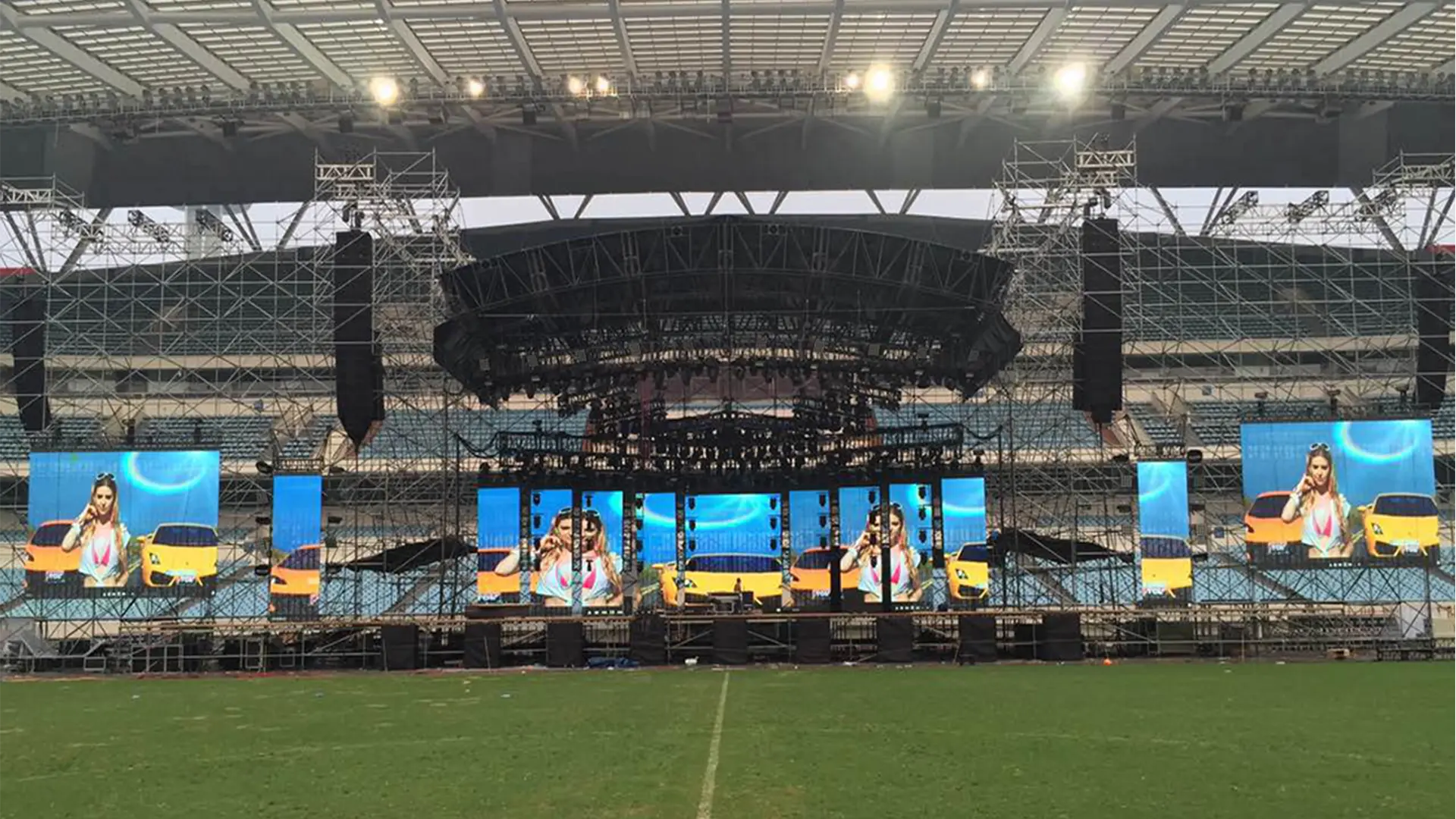
Installing a stage LED display requires careful planning and execution to ensure optimal performance and longevity. Below are answers to common questions that can help guide you through the process, ensuring your stage setup is both effective and reliable.
Before installation, several steps must be taken:
Site Assessment: Ensure the location avoids strong winds, flooding, and obstructions from nearby structures.
Structural Check: Verify that walls or support structures can bear at least 1.5 times the display’s weight.
Power & Network Planning: Plan dedicated power circuits and signal transmission via fiber optic or Ethernet cables.
Weatherproofing: The display enclosure must have an IP65+ waterproof rating; install lightning rods or grounding systems.
Select the appropriate installation method based on your needs:
Wall-Mounted: Suitable for concrete or brick walls; secure using expansion bolts.
Freestanding/Pole-Mounted: Requires a deep foundation (≥1.5m) for stability in open areas like stages.
Suspended: Needs steel support; ensure balance to prevent tilting, which is crucial for stage aesthetics and safety.
To protect against moisture:
Sealing: Use waterproof gaskets between modules and apply silicone sealant for gaps.
Drainage: Include drainage holes at the bottom of the cabinet to prevent water accumulation.
Moisture Protection: Power supplies and control cards should be housed in protective cases or designed to be moisture-resistant.
Proper cable management is essential:
วงจรเฉพาะ: Power each module or control box independently to avoid overload.
การป้องกันสายเคเบิล:ป้องกันสายไฟฟ้าด้วยท่อ PVC หรือโลหะ ให้สายสัญญาณอยู่ห่างจากสายไฟฟ้าแรงสูงอย่างน้อย 20 ซม.
ระบบป้องกันไฟกระชาก: Ground resistance should be less than 4Ω; add surge protectors to signal lines.
After installation, perform these checks:
การปรับเทียบพิกเซล: Use software to adjust brightness and color uniformity, avoiding color deviation.
การทดสอบความสว่าง: Optimize for ambient light conditions (≥5,000 nits for daytime; lower at night).
Signal Test: Check HDMI/DVI inputs for smooth playback, ensuring no interruptions during performances.
Regular maintenance ensures longevity:
การทำความสะอาด: Remove dust with soft brushes; avoid using high-pressure water jets.
การตรวจสอบฮาร์ดแวร์: Tighten screws and inspect supports quarterly.
การบำรุงรักษาระบบทำความเย็น: Clean fans and air conditioner filters regularly. Operating temperature range: -20°C to 50°C.
เตรียมพร้อมรับมือกับสภาพอากาศเลวร้าย:
ปิดเครื่อง:ตัดกระแสไฟฟ้าในช่วงพายุฝนฟ้าคะนองเพื่อป้องกันความเสียหายจากฟ้าผ่า
การเสริมแรง:เพิ่มสายทนลมหรือถอดโมดูลออกชั่วคราวในพื้นที่เสี่ยงพายุไต้ฝุ่น
Key considerations include:
อุณหภูมิ: High heat accelerates aging; install cooling systems.
เวลาการใช้งาน: Limit daily operation to under 12 hours and allow intermittent rest periods.
การสัมผัสกับสิ่งแวดล้อม: In coastal or dusty areas, use anti-corrosion materials such as aluminum cabinets.
By following these guidelines, you can maximize the performance and longevity of your stage LED display, ensuring it operates reliably and effectively in any environment.
คำแนะนำเด็ดๆ
สินค้าขายดี
รับใบเสนอราคาฟรีทันที!
พูดคุยกับทีมขายของเราทันที
หากคุณสนใจสินค้าของเรากรุณาติดต่อเราทันที
ติดต่อทีมขายของเราเพื่อค้นหาโซลูชันที่ปรับแต่งให้เหมาะกับความต้องการทางธุรกิจของคุณอย่างสมบูรณ์แบบ และตอบคำถามใดๆ ที่คุณอาจมี
ที่อยู่อีเมล:info@reissopto.comที่อยู่โรงงาน:อาคาร 6 สวนอุตสาหกรรมจอแบน Huike เลขที่ 1 ถนน Gongye 2 ชุมชน Shiyan Shilong เขตเป่าอัน เมืองเซินเจิ้น ประเทศจีน
วอทส์แอพ:+86177 4857 4559